 Dear Zazie, Here is today’s Lovers’ Chronicle from Mac Tag. Rhett
Dear Zazie, Here is today’s Lovers’ Chronicle from Mac Tag. Rhett
The Lovers’ Chronicle
Dear Muse,
the particulars
of the pursuit
laid out here
in detail
this my measure
better in this, with
thoughts of you
this verse
and havin’ this
and this alone
of more delight
i cannot imagine
you know the answer
as i do
© copyright 2021.2023 mac tag/cowboycoleridge all rights reserved
© copyright 2020 mac tag/cowboy coleridge all rights reserved
this, no ordinary place
where we make
what we can
and you say
and you are
and i say,
yes,
give me more
© copyright 2019 mac tag/cowboy coleridge all rights reserved
the particulars
of the pursuit
of the all mighty tender,
of domesticity,
not my measure
these i better
in this, best
thoughts
of you
this verse
and havin’ this
and this alone
of more delight
i cannot imagine
you know the answer
as i do
© copyright 2018 mac tag/cowboy coleridge all rights reserved
describe
when kissed finally
the dark days behind,
the edge of hope,
the curve of your lips
far more desire
then the way
breath becomes
urgent and the cries
soon, no stoppin’
then all at once
complete
as if always
meant to be,
graspin’, then
lettin’ go
believin’ again
© copyright 2017 mac tag/cowboy Coleridge all rights reserved.
Pass the black cottonwoods,
and enterin’ the sage,
climbin’ the gradual slope
Direction kept in line
with a western star
From time to time
stoppin’ to listen…
only the familiar bark
of coyote and sweep
of wind and rustle of sage
Presently an outcroppin’
of rocks looms up darkly
Climbin’ over the rock,
then down to where
it is sheltered
from the wind
Usin’ a saddle for a pillow,
rolled in blankets,
face upward to the stars
In that wild covert,
eyes shut, comparin’
their loneliness to mine,
Sleep comes
© copyright 2016 Mac tag all rights reserved
And, how about a great love poem today? Who amongst us does not love Shakespeare? Can I get a hell yeah for Will! His plays and sonnets are among my favorite things to read. If I could only own one book if might be his collected works. This is dedicated to you. Rhett
Sonnet 91
by William Shakespeare
Some glory in their birth, some in their skill,
Some in their wealth, some in their body’s force;
Some in their garments, though new-fangled ill;
Some in their hawks and hounds, some in their horse;
And every humour hath his adjunct pleasure,
Wherein it finds a joy above the rest:
But these particulars are not my measure;
All these I better in one general best.
Thy love is better than high birth to me,
Richer than wealth, prouder than garments’ cost,
Of more delight than hawks or horses be;
And having thee, of all men’s pride I boast:
Wretched in this alone, that thou mayst take
All this away, and me most wretched make.
“Sonnet 91” by William Shakespeare. Public domain.
Click Here For Zazie’s Reply
Today is the birthday of Carlo (or Carlino) Dolci (Florence May 1616 – 17 January 1686 Florence); painter of the Baroque period, active mainly in Florence, known for highly finished religious pictures, often repeated in many versions.
Gallery
| Ralph Waldo Emerson | |
|---|---|
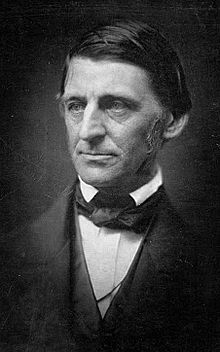
Emerson in 1857
|
|
Today is the birthday of Ralph Waldo Emerson (Boston, May 25, 1803 – April 27, 1882 Concord); essayist, lecturer, and poet who led the Transcendentalist movement of the mid-19th century. He was seen as a champion of individualism and a critic of the countervailing pressures of society. Emerson disseminated his thoughts through dozens of published essays and more than 1,500 public lectures across the United States. He formulated and expressed the philosophy of Transcendentalism in his 1836 essay, “Nature”. Emerson gave a speech entitled “The American Scholar” in 1837, which Oliver Wendell Holmes Sr. considered to be America’s “Intellectual Declaration of Independence”. His first two collections of essays Essays: First Series and Essays: Second Series, published respectively in 1841 and 1844—represent the core of his thinking, and include such well-known essays as “Self-Reliance”, “The Over-Soul”, “Circles”, “The Poet” and “Experience”. In my opinion, he is one of the linchpins of the American romantic movement.
I hung my verse in the wind
Time and tide their faults will find.
- “The Test”, as quoted in Emerson As A Poet (1883) by Joel Benton, p. 40.
- Sunshine cannot bleach the snow,
Nor time unmake what poets know.- “The Test”, as quoted in Emerson As A Poet (1883) by Joel Benton, p. 40
The horseman serves the horse,
The neatherd serves the neat,
The merchant serves the purse,
The eater serves his meat;
‘T is the day of the chattel,
Web to weave, and corn to grind;
Things are in the saddle,
And ride mankind.
- “Ode,” Complete Works (1883), vol. 9, p. 73.
- Give all to love;
Obey thy heart;
Friends, kindred, days,
Estate, good fame,
Plans, credit, and the muse;
Nothing refuse.- Give All to Love, st. 1.
- Though thou loved her as thyself,
As a self of purer clay,
Tho’ her parting dims the day,
Stealing grace from all alive,
Heartily know,
When half-gods go,
The gods arrive.- Give All to Love, st. 4.
He thought it happier to be dead,
To die for Beauty, than live for bread.
- Beauty
A ruddy drop of manly blood
The surging sea outweighs,
The world uncertain comes and goes;
The lover rooted stays.
- Friendship
| Louise de Broglie, Countess d’Haussonville | |
|---|---|

Portrait of Comtesse d’Haussonville by Ingres(1845)
|
|
Today is the birthday of Louise de Broglie, Countess d’Haussonville (Coppet, Switzerland 25 May 1818 – 21 April 1882 Paris); essayist and biographer, and a member of the House of Broglie, a distinguished French family. A granddaughter of the novelist Germaine de Staël, she was considered independent, liberal, and outspoken. Her 1845 portrait by Jean-Auguste-Dominique Ingres, which took three years to complete, has been exhibited in the Frick Collection in New York City since the 1930s.
Louise wrote an unpublished autobiography recounting a highly cultured education and upbringing. From an early age, she was enthusiastic about literature and music, opera in particular—Ingres would later include opera glasses in her portrait. Notably intellectual, she was said to have read every new book. At age 11, she attended the opening night of Victor Hugo’s play “Hernani”, famous for the demonstrations it provoked; as a young pianist, she had personally known Chopin. She was also considered a talented watercolorist.
In October 1836 at age 18, she married the future French National Assembly member and historian Joseph d’Haussonville (1809–1884). “I was destined to beguile, to attract, to seduce, and in the final reckoning to cause suffering in all those who sought their happiness in me”, Louise wrote; “I wanted to marry young and have a brilliant position in society. And that, basically, was the only reason I wanted to marry him”, she said. Whatever her initial sentiments, the marriage seems to have evolved into a happy one.
Louise and her husband first met Ingres in Rome in 1840, while he was directing the French Academy in Rome and living at the Villa Medici. They became convinced of his suitability to paint her portrait after viewing his recently completed Antiochus and Stratonice (today in the Condé Museum).

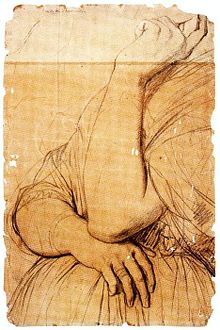


Many critics have noted the anatomical impossibility of Louise’s pose, her right arm seeming to originate at her left shoulder. It would also be impossible to see Louise’s raised hand in the mirror’s reflection, though Ingres included it.
| Theodore Roethke | |
|---|---|
 |
|
Today is the birthday of Theodore Huebner Roethke (Saginaw, Michigan, May 25, 1908 – August 1, 1963 Bainbridge Island, Washington); poet. He published several volumes of award-winning and critically acclaimed poetry. In my opinon; one of the most accomplished and influential poets of his generation. Roethke’s work is characterized by its introspection, rhythm and natural imagery. He was awarded the Pulitzer Prize for poetry in 1954 for his book The Waking, and he won the annual National Book Award for Poetry twice, in 1959 for Words for the Wind and posthumously in 1965 for The Far Field. In the November 1968 edition of the Atlantic Monthly, former U.S. Poet Laureate and author James Dickey wrote Roethke was: “in my opinion the greatest poet this country has yet produced.”
Open House (1941)
- My secrets cry aloud.
I have no need for tongue.
My heart keeps open house,
My doors are widely swung.
An epic of the eyes
My love, with no disguise.- “Open House,” ll. 1-6
- My truths are all foreknown,
This anguish self-revealed.
I’m naked to the bone,
With nakedness my shield.- “Open House,” ll. 7 – 11
- The light comes brighter from the east; the caw
Of restive crows is sharper on the ear.- “The Light Comes Brighter,” ll. 1-2
The Lost Son and Other Poems (1948)
- Over the gulfs of dream
Flew a tremendous bird
Further and further away
Into a moonless black,
Deep in the brain, far back.- “Night Crow,” ll. 4-
- Voice, come out of the silence.
Say something.
Appear in the form of a spider
Or a moth beating the curtain.Tell me:
Which is the way I take;
Out of what door do I go,
Where and to whom?- The Lost Son, ll. 24 – 29
- The salt said, look by the sea,
Your tears are not enough praise,
You will find no comfort here,
In the kingdom of bang and blab.- The Lost Son, ll. 32 – 35
- The mind moved, not alone,
Through the clear air, in the silence.
-
- Was it light?
- Was it light within?
- Was it light within light?
- Stillness becoming alive,
- Yet still?
- The Lost Son, ll. 161 – 167
- A lively understandable spirit
Once entertained you.
It will come again.
Be still.
Wait.- The Lost Son,” ll. 168-172
- I saw the separateness of all things!
My heart lifted up with the great grasses;
The weeds believed me, and the nesting birds.- “A Field of Light,” ll. 45-47
- The wind sharpened itself on a rock;
A voice sang:
-
- Pleasure on ground
- Has no sound,
- Easily maddens
- The uneasy man.
- “The Shape of the Fire,” ll. 40 – 45
- Mother of quartz, your words writhe into my ear.
Renew the light, lewd whisper.- “The Shape of the Fire,” ll. 54 – 55
- The wasp waits.
The edge cannot eat the center.
The grape listens.
The path tells little to the serpent.
An eye comes out of the wave.
The journey from flesh is longest.
A rose sways least.
The redeemer comes a dark way.- “The Shape of the Fire,” ll. 56-63
- Death was not. I lived in a simple drowse:
Hands and hair moved through a dream of wakening blossoms.
Rain sweetened the cave and the dove still called;
The flowers leaned on themselves, the flowers in hollows;
And love, love sang toward.- “The Shape of the Fire,” ll. 73-77
- To stare into the after-light, the glitter left on the lake’s surface,
When the sun has fallen behind a wooded island;
To follow the drips sliding from a lifted oar
Held up, while the rower breathes, and the small boat drifts quietly shoreward;
To know that light falls and fills, often without our knowing.- The Shape of the Fire,” ll. 88-92
Praise to the End! (1951)
- I’ll seek my own meekness.
What grace I have is enough.
The lost have their own pace.
The stalks ask something else.
What the grave says,
The nest denies.- “Unfold! Unfold!,” ll. 59-64
- Bless me and the maze I’m in!
Hello, thingy spirit.- “I Cry, Love! Love!,” ll. 20-21
- Beginnings start without shade,
Thinner than minnows.
The live grass whirls with the sun,
Feet run over the simple stones,
There’s time enough.
Behold, in the lout’s eye, love.- “I Cry, Love! Love!,” ll. 33-39
The Waking (1953)
- I take this cadence from a man named Yeats:
I take it and I give it back again:
For other tunes and other wanton beats
Have tossed my heart and fiddled through my brain.
Yes, I was dancing mad, and how
That came to be the bears and Yeats would know.- “Four for Sir John Davies,” ll. 19-24
- Dante attained the purgatorial hill,
Trembled at hidden virtue without flaw,
Shook with a mighty power beyond his will, —
Did Beatrice deny what Dante saw?
All lovers live by longing, and endure:
Summon a vision and declare it pure.- “Four for Sir John Davies,” ll. 73-78
The Waking
- I wake to sleep, and take my waking slow.
I feel my fate in what I cannot fear.
I learn by going where I have to go.
- Light takes the Tree; but who can tell us how?
The lowly worm climbs up a winding stair;
I wake to sleep, and take my waking slow.
- Great Nature has another thing to do
To you and me; so take the lively air,
And, lovely, learn by going where to go.
- This shaking keeps me steady. I should know.
What falls away is always. And is near.
I wake to sleep, and take my waking slow.
I learn by going where I have to go.
Words for the Wind (1958)
- I knew a woman, lovely in her bones,
When small birds sighed, she would sigh back at them;
Ah, when she moved, she moved more ways than one:
The shapes a bright container can contain!- “I Knew a Woman,” ll. 1 – 4
- Let seed be grass, and grass turn into hay:
I’m martyr to a motion not my own;
What’s freedom for? To know eternity.
I swear she cast a shadow white as stone.
But who would count eternity in days?
These old bones live to learn her wanton ways:
(I measure time by how a body sways.)- “I Knew a Woman,” ll. 22-28
- Is pain a promise? I was schooled in pain,
And found out what I could of all desire;
I weep for what I’m like when I’m alone
In the deep center of the voice and fire. - I know the motion of the deepest stone.
Each one’s himself, yet each one’s everyone.- “The Sententious Man,” ll. 31-36
- The night wind rises. Does my father live?
Dark hangs upon the waters of the soul.
My flesh is breathing slower than a wall.
Love alters all. Unblood my instinct, love.- “The Renewal,” ll. 7-10
- I lived with deep roots once:
Have I forgotten their ways —
The gradual embrace
Of lichen around stones?- “Plaint,” ll. 13-16
- I have gone into the waste lonely places
Behind the eye.- “Meditations of an Old Woman: First Meditation,” ll. 76-77
The Far Field (1964)
- Too much reality can be a dazzle, a surfeit;
Too close immediacy an exhaustion- “The Abyss”
- A terrible violence of creation,
A flash into the burning heart of the abominable;
Yet if we wait, unafraid, beyond the fearful instant,
The burning lake turns into a forest pool,
The fire subsides into rings of water,
A sunlit silence.- “The Abyss”
- Being, not doing, is my first joy.
- “The Abyss,” l. 100
- Pain wanders through my bones like a lost fire;
What burns me now? Desire, desire, desire.- “The Marrow,” ll. 11-12
- Let others probe the mystery if they can.
Time-harried prisoners of Shall and Will —
The right thing happens to the happy man.- “The Right Thing,” ll. 1-3
- And I dance with William Blake
For love, for Love’s sake;And everything comes to One,
As we dance on, dance on, dance on.- Once More, the Round,”
And today is the birthday of Raymond Carver (Raymond Clevie Carver Jr.; Clatskanie, Oregon; May 25, 1938 – August 2, 1988 Port Angeles, Washington); short-story writer and poet. Carver contributed to the revitalization of the American short story during the 1980s. Carver’s first wife was Maryann Burk. The fall of their marriage began with Carver’s trip to Missoula, Mont., in 1972 to fish with friend and literary helpmate Bill Kittredge. That summer Ray fell in love with Diane Cecily, an editor at the University of Montana, whom he met at Kittredge’s birthday party. “That’s when the serious drinking began. It broke my heart and hurt the children. It changed everything.” By fall of 1974, Maryann wrote, “he was more dead than alive. I had to drop out of the Ph.D. program so I could get him cleaned up and drive him to his classes”. Friends urged her to leave Raymond. “But I couldn’t. I really wanted to hang in there for the long haul. I thought I could outlast the drinking. I’d do anything it took. I loved Ray, first, last and always.” She describes, without a trace of rancor, what finally put her over the edge. In the fall of ’78, with a new teaching position at the University of Texas at El Paso, Ray started seeing Tess Gallagher, a writer from Port Angeles, who would become his muse and wife near the end of his life. “It was like a contretemps. He tried to call me to talk about where we were. I missed the calls. He knew he was about to invite Tess to Thanksgiving.” So he wrote a letter instead. “I thought, I’ve gone through all those years fighting to keep it all balanced. Here it was, coming at me again, the same thing. I had to get on with my own life. But I never fell out of love with him.”Carver met the poet Tess Gallagher at a writers’ conference in Dallas, Texas, in November 1977. Beginning in January, 1979, Carver and Gallagher lived together in El Paso, Texas; in a borrowed cabin near Port Angeles, Washington; and in Tucson, Arizona. In 1980, the two moved to Syracuse, New York, where Gallagher had been appointed the coordinator of the creative writing program at Syracuse University; Carver taught as a professor in the English department. He and Gallagher jointly purchased a house in Syracuse, at 832 Maryland Avenue. In ensuing years, the house became so popular that the couple had to hang a sign outside that read “Writers At Work” in order to be left alone. In 1982, Carver and first wife, Maryann, were divorced. He married Gallagher in 1988 in Reno, Nevada. Six weeks later, on August 2, 1988, Carver died in Port Angeles, Washington, from lung cancer at the age of 50. In the same year, he was inducted into the American Academy of Arts and Letters.He is buried at Ocean View Cemetery in Port Angeles, Washington. The inscription on his tombstone reads:
LATE FRAGMENT
And did you get what
you wanted from this life, even so?
I did.
And what did you want?
To call myself beloved, to feel myself
beloved on the earth.
What We Talk About When We Talk About Love (1981)
- Mel thought real love was nothing less than spiritual love. He’d said he’d spent five years in a seminary before quitting to go to medical school. He said he still looked back on those years in the seminary as the most important years of his life.
- There was a time when I thought I loved my first wife more than life itself. But now I hate her guts. I do. How do you explain that? What happened to that love? What happened to it, is what I’d like to know. I wish someone could tell me.
- “Something’s died in me,” she goes. “It took a long time for it to do it, but it’s dead. You’ve killed something, just like you’d took an axe to it. Everything is dirt now.”
- “All this, all of this love we’re talking about, it would just be a memory. Maybe not even a memory. Am I wrong? Am I way off base? Because I want you to set me straight if you think I’m wrong. I want to know. I mean, I don’t know anything, and I’m the first one to admit it.”
- A man can go along obeying all the rules and then it don’t matter a damn anymore.
- “My heart is broken,” she goes. “It’s turned to a piece of stone. I’m no good. That’s what’s as bad as anything, that I’m no good anymore.”
- Drinking’s funny. When I look back on it, all of our important decisions have been figured out when we were drinking. Even when we talked about having to cut back on drinking, we’d be sitting at the kitchen table or out at the picnic table with a six-pack or whiskey.
Mac Tag

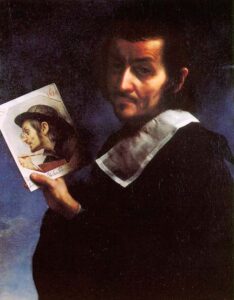
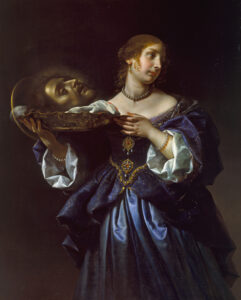
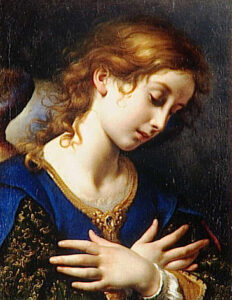
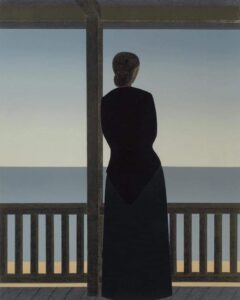
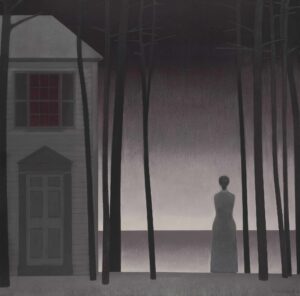
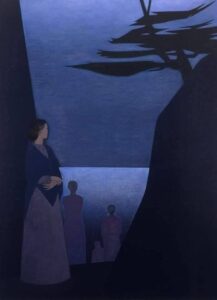
No Comments on "The Lovers’ Chronicle 25 May – always – art by Carlo Dolci & Will Barnet – verse by Ralph Waldo Emerson & Theodore Roethke – birth of Louise de Broglie & Raymond Carver"